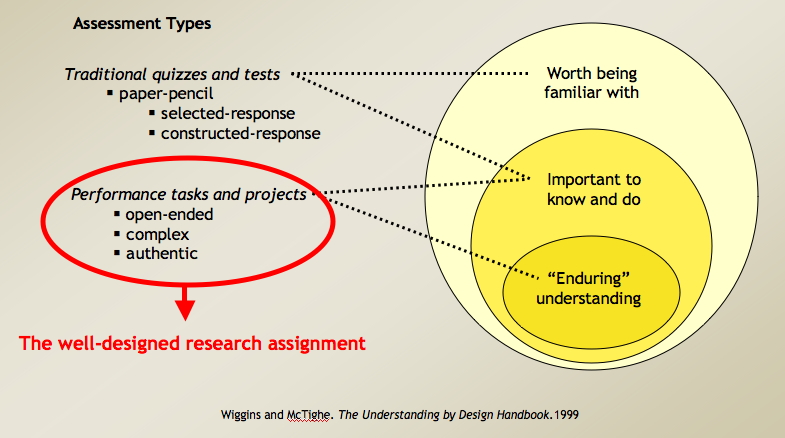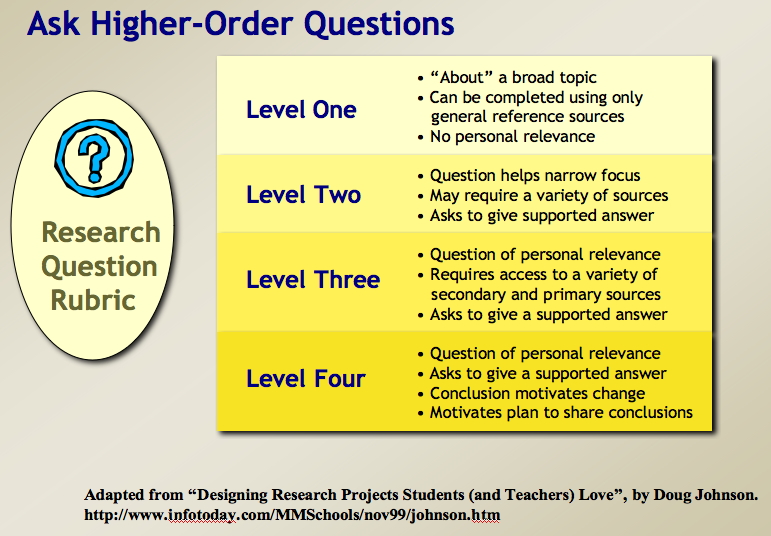Contents
- 1Teaching Research
- 2Tips for Teaching Research
- 2.1Start with the Right Question
- 2.2Consider Broadening the Repertoire of Culminating Tasks
- 2.3Teach and Assess Process as Well as Product
- 2.4Target Specific Information Skills for Instruction and Assessment
- 2.5Integrate Technology
- 2.6Consider and Foster Multiple Literacies
- 2.7Move Beyond Information Gathering to Knowledge Building
- 2.8Partner with Your Teacher-Librarian or Digital Literacy Support Teacher

Inquiry is a complex process of constructing personal meaning, applying critical thinking skills, solving problems, creating understanding, and questioning.
In its truest form, the inquiry process requires an individual to look deeper and beyond the obvious, examine information for validity, point of view and bias, and construct meaning from all of these endeavours.
Effective application of an inquiry model can transform novice learners into interdependent and independent learners, confident of their information power.
Expectations for inquiry and research are woven throughout the Ontario Curriculum. Explicitly teaching the complex skills of inquiry and research help students to move beyond collecting info-bits to being critical consumers of information, able to construct their own understanding of issues. As we prepare students to be lifelong learners in an age of rapid and complex change and an extraordinarily complex and dynamic information environment, this has never been as important.
Teaching Research

A well-designed research project is one of the most direct routes to enduring understanding. Research offers opportunities for open-ended inquiry, complex and critical thinking, and authentic learning experiences.
This website is designed to provide very practical resources, lessons, downloadable organizers and video tutorials to help students learn the inquiry and research process. Waterloo Region District School Board teacher-librarians invite you to collaborate with them in the design of inquiry assignments and instruction.
Tips for Teaching Research
Start with the Right Question
Lower order questions on research assignments, typically questions that ask students to gather information about a broad topic, encourage shallow and superficial inquiry. This type of question invites plagiarism, as students can hunt, gather, copy and paste info-bits to fulfil the requirements of the assignment.
By contrast, questions that are deep, relevant, authentic and meaningful to the student foster deeper, more relevant and more meaningful research.
Deeper questions from the teacher foster deeper questioning on the part of the student.
Consider Broadening the Repertoire of Culminating Tasks
The traditional products assigned as the culminating task to a research project may not always be the best to foster learning. Consider kicking your assignments up a notch by increasing the repertoire of available culminating tasks. Help students match the most appropriate medium to communicate their learning with their purpose in writing, their desired audience, and their writing form. New media offer new opportunities for creating authentic and meaningful products for a real audience.
Teach and Assess Process as Well as Product
The research process provides a scaffold for student success, and an opportunity to use formative assessment. This website outlines the research process and links each phase with a wealth of instructional resources for you to use with your students – everything from video tutorials to downloadable organizers. Connect to the Research Process section of this website.
Target Specific Information Skills for Instruction and Assessment
Some curriculum outcomes align very well with teaching specific information skills. Targeting a specific skill (i.e., effective note-taking) increases students’ independence with the task for subsequent assignments. The Learning section of this website contains a wealth of teaching and learning materials for a wide range of information skills.
Integrate Technology
Many library resources are now offered online. Students access the huge range of information that inundates the Internet and online social media. Technology offers many opportunities for authentic and powerful communication, collaboration for learning, differentiation and processing ideas. The Teaching with Technology page in this section offers some suggestions for technologies that support each phase of the research process.
Consider and Foster Multiple Literacies
Thinking critically about information today means that students must move beyond traditional literacy. Recognizing this means providing opportunities for students to read and write for different purposes, evaluate texts, navigate and create texts in a variety of formats, and interpret media texts, images and graphics as part of the research process. Students need multiple opportunities to practice their critical literacy skills through inquiry.
Move Beyond Information Gathering to Knowledge Building
Never before has it been as important as it is now to be able to use information effectively for building knowledge.
As the amount of information grows exponentially, critical readers and writers need to reflect, question, predict, and connect texts to build understanding. A school library program helps students in their reading and writing to differentiate between fact and opinion, assess credibility, and to think critically about the information and ideas they encounter and communicate.
The Learning section of this website offers a wealth of resources for you to use with your students as they build their knowledge through inquiry and research.
Partner with Your Teacher-Librarian or Digital Literacy Support Teacher
Your teacher-librarian and digital literacy support teacher is knowledgeable about teaching the inquiry and research process and can help you in the design and planning of inquiry units, teaching specific information skills, assessing student work, and linking your students to the wealth of resources offered by the library and beyond. The collaborative learning section suggests ways in which teacher-librarians and other library staff can support you.

